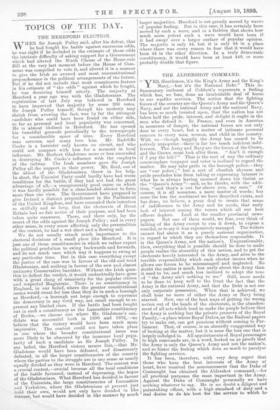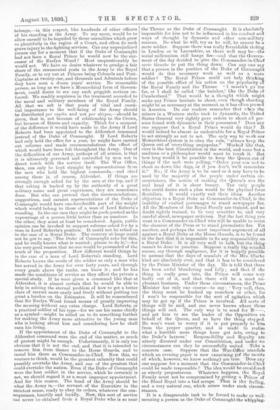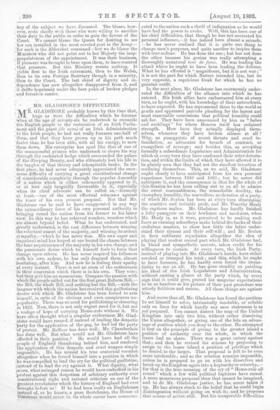THE ALDERSHOT COMMAND.
" yES, Gentlemen, it's the King's Army and the King's. Navy,—but it's the National Debt." This in- • flammatory outburst of Cobbett's represents a feeling. which has, we fear, done an incalculable deal of harm, to our warlike services. The notion that the fighting forces of the country are the Queen's Army and the Queen's Navy, and not the national Army and the national Navy,. has been so much insisted upon, that the nation has not taken half the pride, interest, and delight it ought in the men who defend it. In France, and even in America. in moments of danger, the national forces are not only dear to every heart, but a matter of intimate personal concern to every man, woman, and child in the country. With us—though happily the Army has ceased to be actively unpopular—there is far too much indolent indif- ference. The Army and Navy are the forces of the Crown, and the Crown. must look after them. "Ain't it enough, if I pay the bill P" That is the sort of way the ordinary commonplace taxpayer and voter is inclined to regard the matter. He may take glide in the borough police,—they are "our police ; " but a sort of churlish shyness and+ pride precludes him from taking or expressing interest in what he is always having rammed down his throat as the " Queen's Army "—and, as he thinks, with the addi- tion, "and that's a cut far above you, my man." Of course, it is all nonsense, a mere matter of words; but none the less the sentiment we have described exists, ands has done, we believe, a great deal to create that sense, of indifference to the Army and its needs, that surly lack of interest among the voters which all our best officers deplore. Look at the smaller provincial news- papers. Not one of them would, we fear, ever think of talking of the Army except to run it down, to expose a scandal, or to say it was expensively managed. The writers. cannot feel about it as a purely national organisation, in regard to which they are themselves responsible. It is the Queen's Army, not the nation's. Unquestionably, then, everything that is possible should be done to make people realise the absurdity of this notion, and to get the electorate keenly interested in the Army, and alive to the terrible responsibility which each elector incurs when he allows our forces to be mismanaged and neglected. No doubt the nation is much less surly about the Army than it used to be, and much less inclined to adopt the tone of " the Army ain't nothing to me." Still, more needs to be done to keep well to the front the fact that the Army is the national Army, and that the Debt is not our only corporate possession. When that is achieved, we shall hear no more of either the Army or Navy being starved. Now, one of the best ways of getting the wrong notion out of the heads of the electorate, is the abandon- ment of all acts which tend to make the people believe that the Army is nothing but the private preserve of the Royal Family,—a place where Royal Dukes, as the Radical papers try to make out, can get pensions without coming to Par- liament. That, of course, is an absurdly exaggerated way of looking at the matter, but it is none the less one that is. largely indulged in. All appointments of Royal personages. to high commands are, in a word, looked on as proofs that the Army is only the Queen's Army and not the nation's, and so foster the feeling which does so much to paralyse the fighting services. It has been, therefore, with very deep regret that those who have the best interests of the Army at heart, have received the announcement that the Duke of Connaught has obtained the Aldershot command,—for all practical purposes the most important in the Army. Against the Duke of Connaught personally we have nothing whatever to say. He is no doubt a diligent and painstaking officer, with a high standard of duty and a real desire to do his best for the service to which he helongs,—in this respect, like hundreds of other officers of his standing in the Army. To say more, would be to allow oneself to be beguiled by those unrealities which grow so plentifully in the region of a Court, and often do such grave injury to the fighting services. Can any unprejudiced i person say for a moment that if the Duke of Connaught had not been a Royal Prince he would now be the suc- cessor of Sir Evelyn Wood ? Most unquestionably he would not. We have no desire whatever to grudge a fair share of the ornamental posts in the Army to the Royal Family, or to cry out at Princes being Colonels and Post- Captains at twenty-one, and Generals and Admirals before they have seen a dozen years' service. No reasonable person, as long as we have a Monarchical form of Govern- ment, could desire to see any such priggish notions en- forced. We readily acquiesce in the treatment accorded to the naval and military members of the Royal Family. All that we ask is that posts of vital and essen- tial importance to the well-being of the Army should be distributed per capita and not per stirpes,—should be given, that is, not because of relationship to the Crown, but because of fitness and capacity. Think for a moment of the difference it would have made to the Army if Lord Roberts had been appointed to the Aldershot command instead of the Duke of Connaught. If Lord Roberts had only held the office for a year, he might have carried out reforms and made recommendations the effect of which would have been felt throughout the Army. One of the difficulties of our Army, perhaps of all armies, is that it is ultimately governed and controlled by men not in direct touch with the service itself. The War Office, then, can only be kept straight by representations fr,mi the men who hold the highest commands,—and chief among these is, of course, Aldershot. If things are strongly enough asked for by the men at the top, and if that asking is backed up by the authority of a great military name and great experience, they are sometimes done. But who can pretend that the recommendations, suggestions, and earnest representations of the Duke of Connaught would have one-hundredth part of the weight which would belong to those of a man of Lord Roberts's standing. In the one case they might be pooh-poohed as the vapourings of a person little better than an amateur. In the other, they must at least be considered. Again, public opinion can be invoked to support reforms asked for by a man in Lord Roberts's position. It could not be relied on in the case of a Royal Duke. The country at large could not be got to say, • The Duke of Connaught asks for this, and he really knows what is wanted ; please to do it,'—for the very good reason that no one would be persuaded of the truth of the proposition. How different would things be in the case of a man of Lord Roberts:s standing. Lord Roberts knows the needs of the soldier as only a man who has served in the Army for over forty years, and through every grade above the ranks, can know it ; and he has made the conditions of service as they affect the private a special study. If he were given a command like that at Aldershot, it is almost certain that he would be able to help in solving the eternal problem of how to get a better class of recruit more easily and freely without putting too great a burden on the Estimates. It will be remembered that Sir Evelyn Wood found means of greatly improving the messing without any extra charge. Lord Roberts, or a practical soldier of his type—for we use his name chiefly as a symbol—might be relied on to do something further for making the Army more attractive to the young man who is looking about him and considering how he shall earn his living.
If the appointment of the Duke of Connaught to the Aldershot command were the end of the matter, so much of protest might be enough. Unfortunately, it is only too obvious that it is not the end, and that it is intended to remove him from thence to the Horse Guards, and to instal him there as Commander-in-Chief. Now this, we venture to think, would be the greatest calamity that could possibly overtake the Army, and one of the greatest that could overtake the nation. Even if the Duke of Connaught were the best soldier in the service, which he certainly is not, we should regard it as a most improper appointment. And for this reason. The head of the Army should be what the Army is,—the servant. of the Executive in the strictest sense, ready to obey its orders, whatever the con- sequences, heartily and loyally. Now, this sort of service can never be obtained from a Royal Duke who is so near the Throne as the Duke of Connaught. It is absolutely impossible for him not to be influenced in his conduct and ways of thought by dynastic and other non-military reasons. Do what he will, try as he will, he cannot be a mere soldier, Suppose there was really formidable rioting in London or in Lancashire, as there well may be—the social millennium still hangs fire—and that the Govern- ment of the day decided to give the Commander-in-Chief carte blanche to put the thing down. Can any one say that a person in the position of the Duke of Connaught would do this necessary work as well as a mere soldier ? The Royal Prince could not help thinking of the possible effect of his action on the popularity o the Royal Family and the Throne. "I mustn't go too far, or I shall be called the butcher,' like the Duke of Cumberland." That would be a thought which might make any Prince hesitate to shoot, even though shooting might be as necessary at the moment as it has often proved in America. Do our readers remember that when the miners in a Western strike took to dynamite, the United States General very rightly gave orders to shoot all per- sons found with dynamite in their possession P Does any one suppose that a Royal Prince would do that P Lt would indeed be almost as undesirable for a Royal Prince to act strongly as not to act. The only way to work our Monarchical system is to obey the rule, "always keep the Queen out of everything unpopular." Worked like that, ours is the best Constitution in the world, and none but a madman or a philosopher would want to touch it. But how long would it be possible to keep the Queen out of things if the mob were yelling, " Order your son not to shoot us down like dogs, or if you don't, we'll remember it." No ; if the Army is to be used as it may have to be used by the majority of the people under certain cir- cumstances, the notion of making the Queen's son the real head of it is sheer lunacy. The only people who could desire such a plan would be the physical force Socialists. It would exactly suit their ideas. Another objection to a Royal Duke as Commander-in-Chief, is the inability of exalted personages to stand newspaper fire. All the Members of the Royal Family are trained, and no doubt rightly trained, to be very sensitive to, and very careful about, newspaper criticism. But the last thing you want is a Commander-in-Chief who will be unable to resist the clamour of the Press or to stand journalistic fire. Yet another, and perhaps the most important argument of all against a Royal Duke at the Horse Guards, is to be found in the fact that it is impossible to fix any responsibility on a Royal Duke. It is all very well to talk, but the thing cannot be done in practice. Suppose a really big scandal occurs, say through negligence, for it is happily possible to assume that the days of scandals of tho Mrs. Clarke kind are absolutely over, and that it has to be considered by the Prime Minister of the day. He is told that there has been awful blundering and folly ; and that if the thing is really gone into, the Prince will come very badly out of it, and that there will be a most un- pleasant business. Under these circumstances, the Prime Minister has only one course—to say : ' Very well, then, the thing must be hushed up somehow or other, for I won't be responsible for the sort of agitation which may be got up if the Prince is involved. All sorts of things will be said, and one never knows where those things will end. The only way is to send for R , and get him to see the leader of the Opposition on behalf of the Queen, and so have the thing stopped. He won't want to worry if it is put properly to him from the proper quarter, and is made to realise what a horrible mess things have got into, owing to the Duke's laxness.' Responsibility and Royalty are utterly divorced under our Constitution, and under no circumstances can they be successfully united. Take a concrete case. Suppose that the War-Office scandals which an evening paper is now examining (of the merits of which, however, we know nothing) are true. Does any one suppose for a moment that the Commander-in-Chief could be made responsible ? The idea would be considered as utterly preposterous. Whatever happens, the Royal Family must not be compromised by getting a Prince of the Blood Royal into a bad scrape. That is the feeling, and a very natural one, which arises under such circum- stances.
It is a disagreeable task to be forced to make so well- meaning a person as the Duke of Connaught the whipping- boy of the subject we have discussed. The blame, how- , ever, rests chiefly with those who were willing to sacrifice their duty to the public in order to gain the favour of the Court. We cannot blame the Queen for desiring to see her son installed in the most coveted post in the Army- . for such is the Aldershot command—but we do blame the Ministers who did not point out to her Majesty the inap- propriateness of the appointment. It was their business, . if pressure was brought to bear upon them, to have resisted that pressure. But this Ministry resists nothing. It yields first to the Irish extremists, then to the Welsh, then to its own Foreign Secretary though in a minority, then to the Court. The last shred of dignity and in- dependence has now altogether disappeared from it, and it drifts hopelessly under the bare poles of broken pledges and forsaken causes.




































 Previous page
Previous page